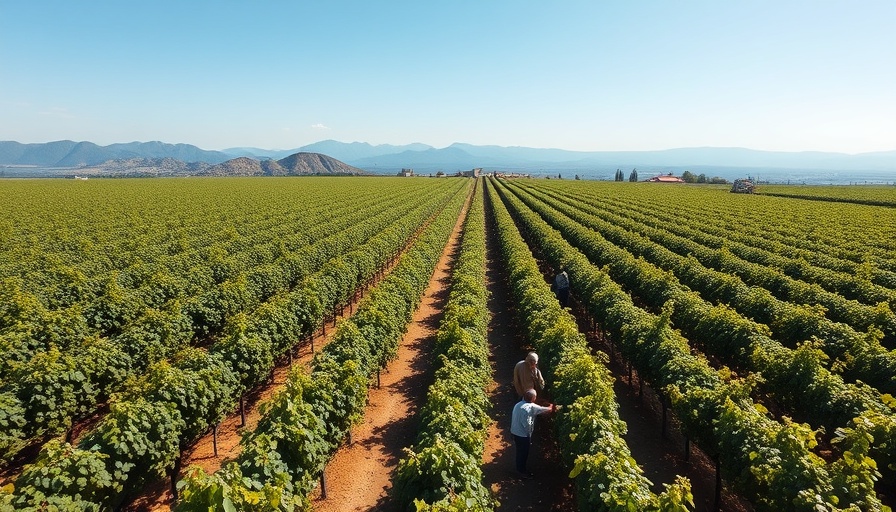
The Dark Side of Champagne: Human Trafficking Exposed
In a shocking verdict delivered on July 22, 2025, a French court has handed down jail sentences to three individuals for their involvement in a human trafficking case within the champagne industry. The court revealed the exploitation of vulnerable seasonal workers, many of whom were undocumented migrants from West Africa, who were allegedly treated "like slaves" during the 2023 harvest season. This landmark ruling has not only marked a decisive moment in the fight against labor exploitation but has also prompted fierce scrutiny of labor practices in the glamorous world of champagne production.
Victims' Narratives: A Harrowing Reality
The investigation uncovered harrowing accounts from more than 50 seasonal workers, primarily hailing from Mali, Mauritania, Senegal, and Ivory Coast. Living in deplorable conditions, these workers were crammed into overcrowded accommodations with insufficient sanitation and access to basic necessities. "They put us in an abandoned building, with no food, no water, no nothing," recounted Modibo Sidibe, one of the victims. Their plight came to light during an inquiry initially aimed at investigating the 2023 vineyard deaths due to extreme heat, emphasizing how closely related health and labor issues are in agricultural sectors.
The Legal Framework: Rigorously Defined Human Trafficking
The French court defined human trafficking within this context as "recruiting, transporting, transferring, housing or receiving a person to exploit them," involving serious abuses of authority. This ruling highlights the importance of continued vigilance regarding labor conditions, especially in industries that significantly contribute to regional economies, like wine and champagne. The director of the servicing company, Anavim, received a two-year prison sentence, while her co-defendants were sentenced to one year each. Nevertheless, the lengthy appeals process indicates that this battle is far from over.
Corporate Accountability: An Industry Under Scrutiny
The court's decision extends beyond individual culpability; it reflects a growing call for systemic changes in corporate oversight within the champagne industry. Maxime Cessieux, an attorney representing the victims, emphasized that the upcoming 2025 harvest would be closely monitored. "No one will be able to say 'I didn't know,'" he warned, pointing to a collective responsibility within the agricultural supply chain. Given that these practices have lingered for years, the ruling serves as a beacon for future reforms.
Global Ramifications: A Reflection of Larger Trends
This ruling doesn't merely signify a localized problem but echoes larger global trends involving exploitation of migrant labor in agriculture. The champagne industry serves as a poignant example of how glamour often masks grim realities. According to the International Labour Organization, millions work under exploitative conditions worldwide, underscoring the need for international solidarity in combating human trafficking. Moving forward, shared responsibility among businesses, governments, and consumers is crucial to addressing these systemic issues.
Emotional Resonance: More Than Just a Legal Decision
The responses from the victims highlight the emotional and deeply human aspect of the court's ruling. For many, the verdict offered a glimmer of hope and validation after enduring a system that frequently ignores their plight. "This decision is fair," said Amadou Diallo, affirming the importance of justice in the face of overwhelming adversity. Such sentiments reflect an unyielding spirit among those who have suffered, emphasizing the critical need for voices to be heard and considered in policy discussions.
Looking Ahead: Mobilizing for Change
The way forward necessitates concerted efforts towards enhancing labor rights and protections across industries, especially those that rely heavily on seasonal and migrant workers. The recent ruling serves as a call to action not only to enforce existing labor laws but also to implement more robust protocols to ensure safe and humane working environments. Individuals can contribute to this cause by getting involved with organizations focused on labor rights, advocating changes at local levels, or simply staying informed about the origins of the products they consume.
As we move forward, it’s vital to remain vigilant about the treatment of workers in all sectors—especially those who contribute to our cherished traditions like champagne making. By reading and engaging with issues of labor rights, we can become a part of the narrative of change and justice.
 Add Element
Add Element  Add Row
Add Row 



Write A Comment